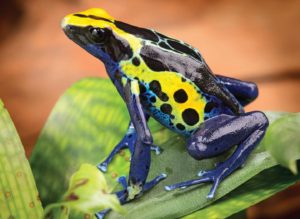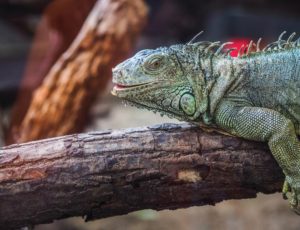What is an exotic pet? What differentiates them from the dogs, cats, rabbits, birds, etc. that we are used to?
These days, fairs and exhibits featuring exotic pets are beginning to attract more attention. Clubs and organizations devoted to exotic pets are springing up everywhere, and more pet owners are beginning to be curious about pets beyond the usual cats, dogs, fish, lovebirds, and hamsters.
On one hand, this is an excellent development, because when people get to know more these creatures, they learn more about the world. But there are many misconceptions about exotic pets which also need to be cleared up. Animal Scene asked several local experts on exotic pets to help give an introduction to the topic and an overview of what it takes to care for an exotic pet.

There are many ways to define the term ‘exotic pet’ so perhaps a good place to start is to enumerate what is considered an exotic pet. Certainly this can change over time; for instance, fish used to be rare and exotic, until aquarium setups became more commonplace and therefore cheaper.
Vin Tan says, “The term ‘exotic pet’ is a catch-all phrase used to describe ‘non-traditional’ pets.” In other words, exotic pets are unusual.
Lendl Christopher Lin expands this definition thus: “Exotic pets are basically the unusual animals kept as pets. These are animals like snakes, lizards, frogs, salamanders, turtles, tortoises, tarantulas, and scorpions. Basically, these are pets that we don’t usually see in a normal household.
Lester de Jesus agrees, adding, “Exotic pets are animals not commonly kept as pets―they are unusual and are not known to be domesticated.” Joane Cruz adds a warning: “Some exotic pets are venomous and deadly, and we don’t recommend (that these be handled).”
Ar-Jan Cheng explains that exotic pets are rare or uncommon; as a result, they are occasionally obtained from underground or even illegitimate sources. Because their natural habitat is in the wild, exotic pets need special attention and care in order for them to survive in an enclosed habitat. Essentially, Tiffany Cham adds, exotic pets “…are wildlife that are kept in captivity, and often, they are not native to our country.”
Exotic pets are not limited to strange breeds and species, though. “There are also exotic birds, fish and other mammals. It all depends on the preference of the keeper,” Lendl explains.
Take reptiles, for example. “Yes, there are reptiles that could be “tamed” but this means that a reptile gets accustomed to human interaction and tolerates being handled and touched―but not like dogs, which they enjoy the affection and attention we give them,” says Lendl. Lester adds, “Some (exotic pets) just tolerate being handled and don’t provide the level of interaction that of dogs and cats.”
Vixvy Panugayan explains that the domestication of animals like dogs took thousands of years which included co-existing with humans. “So, there are thousands of years of difference between a wild and a domestic animal. Domesticated animals like dogs and cats don’t do well without people, and wild and exotic animals don’t do well with people. In addition, the little we do know of the needs of exotic animals shows us that we simply cannot meet all these needs in captivity,” he explains.
Lendl agrees and adds, “Exotic pets are different from dogs, cats, rabbits, birds, and other ‘ordinary’ pets because exotic pets need more understanding and patience. Exotic animals are different from domesticated animals because for one, they don’t really recognize you as their master. In this case, we exotic animal keepers must adjust to the needs and behavior of the animal.”
Given that, what is the appeal of an exotic pet? Lendl says, “Personally, I appreciate exotic animals because they are the living proof that nature is indeed beautiful, and of course, I get to learn a lot of things like their behavior, feeding requirements, and other exotic animal-related things. In the end, it is also a challenge to keep one.”

What are the special considerations one needs to keep in mind when keeping an exotic pet?
Keeping an exotic pet is clearly a responsibility that is not to be taken lightly. Our experts shared advice for those considering such a move. Joane recommends extensive research as you consider getting one so that you understand what you’re getting into. Lester gives a specific example: “Snakes are relatively easier to keep than mammals because they do not need to eat daily. But there are others that have a strict husbandry requirements like proper humidity, substrate, temperature and lighting.
Vin adds that exotic pets are little harder to take care of. “Some exotic pets have extraordinary diets like insects, worms, etc. which are hard to find in pet shops.”
Ar-Jan explains, “Exotic pets are harder to care for in terms of the special food considerations and the special housing you need to provide for them which cannot be obtained from the normal suppliers. You need to provide the utmost care and living areas for them to thrive and grow the right way.”
Another challenge lies in “…environmental requirements to maintain them and specialized requirements in order to breed them,” Tiffany ads.
Vixvy points out several practical considerations that those wanting an exotic pet need to keep in mind: “They need at cage big enough for them to move around. Unlike dogs, they cannot just be put on a lease or let loose. They need certain levels of temperature and humidity that vary according to the animal. (You also need to consider) medical care. Many exotic animals hide systems of illness and even when illness is suspected, finding a veterinarian specializing in exotic pets may prove to be difficult.”
Lendl has a good word for those who are willing to commit to an exotic pet and the work that comes with it. “I believe that all pets are easy to keep as long as you understand the animal that you are keeping. If you keep dogs, cats, fish, or birds, but you don’t know their needs, then it will also be hard for you to keep them. Exotic animals are harder to keep because first of all, husbandry materials and medicine aren’t widely available in the market. Second, we have to have special permits to keep one also. Third is that (some of) these exotic animals require different of temperatures, diet, enclosure size, substrate, handling, etc.”
“But in the end, if one has done proper research and heeds advice from more experienced keepers, there won’t be any problem at all. Just make sure to get an exotic pet that suits your lifestyle. I mean, get an animal that will fit your house, your time, your budget and most especially, yourself,” he adds.
Doing your research isn’t likely to be a problem as basic information is on the Internet and practical information can be obtained from friendly organizations of exotic animal keepers like Boa Keepers of the Philippines and Team Shootfighter. Also, exotic animal husbandry equipment is available in the country at places like Zoo Med and the like, Lendl points out.
Who is best suited to own an exotic pet, and what should they keep in mind? What advice can you give for beginners and those interested to keep in mind when they are choosing an exotic pet?
The first thing anyone thinking of keeping an exotic pet should remember, according to Vin, is, “They need a lot of attention and more time than ordinary or traditional pets, (so owners) need to do a lot of research first on the exotic pet that they like before choosing.”
Joane agrees and adds that someone who knows how to be a responsible pet owner can be an exotic pet owner. As part of a group that believes in the three Rs (research, responsibility, and respect), the research is necessary so that “…they (can) see (if) they can be responsible enough in taking care of these pets.” Just because you want an exotic pet doesn’t mean you can just get one, she says.
Vixvy adds, “(Potential owners) should first do some research about the animal’s requirements and risks to make sure it’s a suitable pet for them. It is important to be knowledgeable about your animal, the food, housing, behavior, and the environment they need, which is essential to its wellbeing.”
There’s another thing you should do research on that people tend to overlook: where to source your exotic pet. “Buy from legal sources and breeders. Alain Phillip Sih of Piper’s Pet World is one of the best or shall I say the only best source of exotic animals in the Philippines. Owning/keeping exotic animals needs proper papers and permits from the DENR (Department of Environment and Natural Resources).”
“Someone who loves animals is best suited for a exotic pet,” says Lester, who agrees with Vin and Joane regarding the importance of research. “But they should keep in mind the space required, the diet needed for the animal that they chose. My advice is to research first before acquiring a certain specie so that you can gauge yourself if you can take care of it for a long time.”
Ar-Jan’s viewpoint is that there are no definite qualifications as to who can care for an exotic pet, “…but in order for you to care for one,you need to be responsible and be prepared for all the possible things that might happen to your pet.” Pay special attention to nutrition requirements, especially if their diet cannot be easily obtained―and of course, do your research! “I would advise beginners to thoroughly study and consider all options before caring for an exotic pet; they need to be responsible and approach it with a clear mind. And lastly, don’t bite off more than you can chew, so to speak.”
Vixvy says, “Any responsible pet owner can own an exotic pet. They can be alternative pets, suitable for people with allergies to furry things, and many require less space that dogs or cats.
Lendl offers some encouragement: “Everyone can keep exotic pets. All they need is patience and proper husbandry. For example, if one wants keep a snake, then one has to know what kind of snake because not all snakes are the same, like green tree pythons are way different than Burmese pythons. If one wants to keep lizards, then they must keep in mind that bearded dragons are very different than monitor lizards. And same goes for keeping invertebrates.”
He does stress, “People who want to keep exotic animals must respect the animal’s space at all times! Remember, exotic animals aren’t like dogs (that like to be petted). People should be willing to spend for their animal’s needs. Keeping them in proper substrates, proper enclosures, proper temperatures, and giving them the proper diet is always a must.”

While Lendl acknowledges that are negligent owners who can keep some exotic pets alive, he stresses that this is not an excuse and neither is it acceptable. “Some (exotic pets) may thrive in slightly poor conditions but we want the best for our pets and we always encourage people to keep their animals responsibly.”
The reason for this is that it’s not just the pets that need protection. “People should make sure that they can keep exotic animals in safe places wherein the animals won’t be able to get out of their enclosures. This is actually for the safety of the people around them and for the animal. In the end, keeping exotic animals is very rewarding especially when you see the true beauty of them,” he explains.
Another important component of your relationship with your exotic pet is respect. “They are not dogs or cat where you can just suddenly pick up or give a command to follow.”
You don’t have to be someone special to take care of an exotic pet, Joane adds, so long as you treat them properly. You should also be mindful that some of them can be deadly. Too often, people buy exotic pets because they find them attractive or exciting, but are unable to commit to learning the proper way of caring for them. You should be willing to commit to giving an exotic pet the environment, care, and diet it needs. “Always keep in mind that they are living things and they need proper care and love like other animals out there,” Joane says.
MEET OUR EXPERTS
• TIFFANY CHAM has been a registered wildlife breeder since 1996.
• AR-JAN CHENG has been an exotic animal aficionado for many years.
• JOANE CRUZ is an administrator of the Nueva Ecija Exotic Club who began caring for exotic animals in 2011 and is currently caring for a bluefang skeleton tarantula.
• LESTER DE JESUS works as an IT Security supervisor and has kept exotic animals as a hobby for 10 years.
• LENDL CHRISTOPHER LIN has kept exotic animals and fish since 2002, and was a shark and rays animal trainer at Manila Ocean Park from 2013-2014.
• VIXVY PANUGAYAN is a hobbyist who is also a member of KEEP (Keepers of Extreme Exotics Philippines).
• VIN TAN loves dogs, cats, and exotic pets; this hobbyist also owns a mini-grocery.
This story appeared in Animal Scene’s April 2015 issue.




